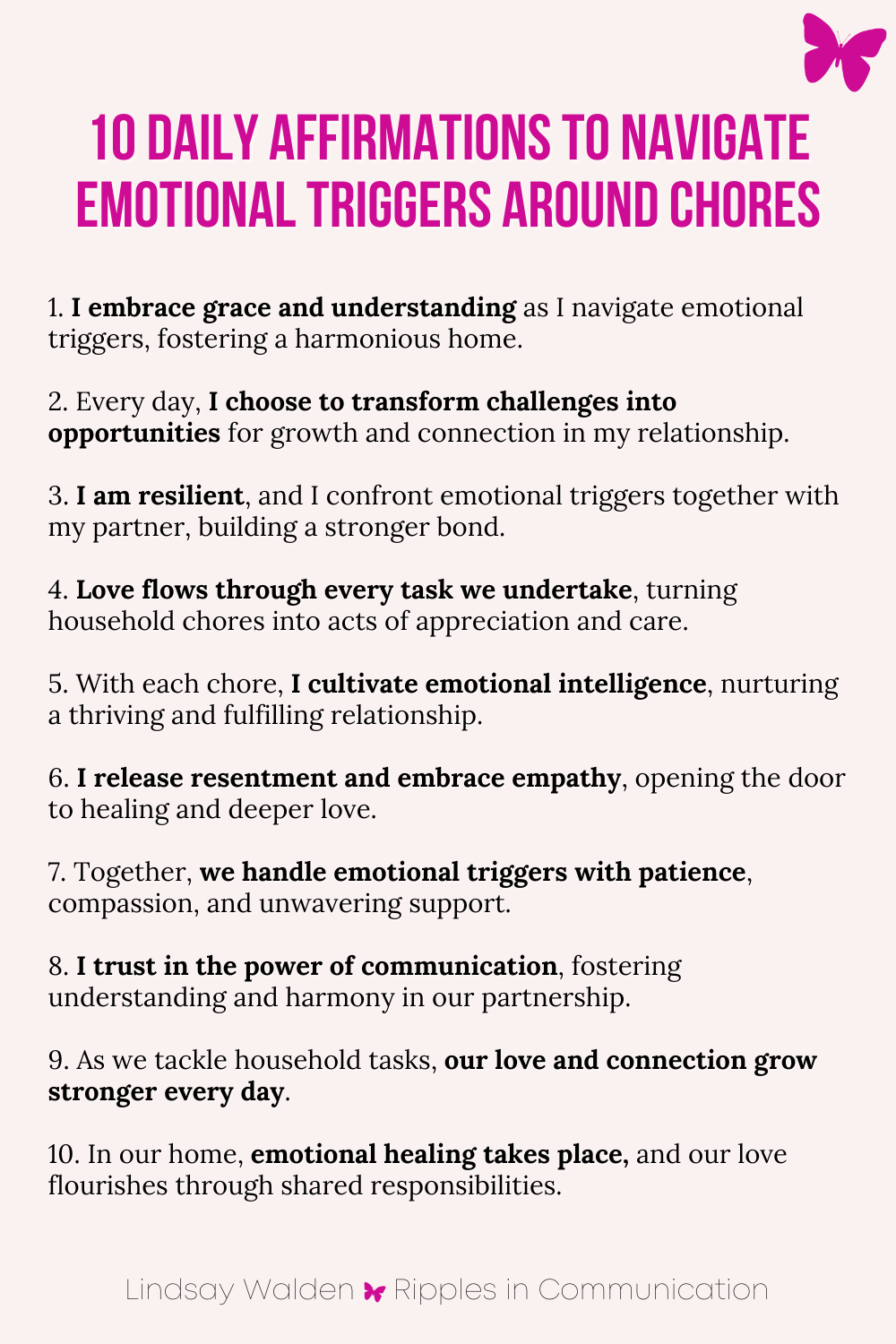How to Address Emotional Triggers Around Household Chores
Household chores can be more than just mundane tasks; they can trigger deep-seated emotions that impact our relationships. Whether it's memories of childhood punishments or feelings of resentment, addressing these emotional triggers is essential for building a harmonious home. In this blog post, we'll explore the powerful influence of emotional triggers on chore dynamics and provide practical strategies to foster open communication and balance around household chores. Keep reading for 5 ways to turn household chores into opportunities for growth and connection.
Have you gotten my FREE Relationship Communication Guide yet? Start building an authentic, conscious, and thriving relationship with your partner TODAY. Say goodbye to misunderstandings, conflicts, and missed opportunities for a deeper connection. These are the same tips and practical advice I give to my clients every day. With this guide, you'll be equipped to navigate any communication challenge and build a strong and fulfilling bond with your partner. Click the button below to enter your email address and I will send the guide to your inbox right away!
Discover how emotional triggers impact household chores and learn to build a harmonious relationship.
The Challenge of Dividing Household Labor
Figuring out how to divide household responsibilities can be a challenging aspect of any relationship. Often, we carry with us certain expectations and past experiences from our childhood that influence how we approach chores and home projects. These triggers can lead to feelings of resentment and discomfort, impacting adult relationship dynamics. It's essential to acknowledge these triggers and work together to find a healthier way to manage household tasks without causing emotional strain.
1. Understanding Triggers: Unraveling the Past
Triggers are real and valid emotional responses rooted in our past experiences. Memories of being punished or forced to do chores as a form of discipline can create negative associations with household tasks. It's crucial to recognize these triggers and discuss them openly with your partner. Take the time to reflect on how these memories may be impacting your current reactions to household responsibilities.
2. Unpacking Weaponized Incompetence: Navigating Unhealthy Dynamics
Sometimes, a partner might engage in "weaponized incompetence," performing household tasks poorly or begrudgingly to avoid responsibility. This behavior can stem from a desire to escape chores or to have the other partner take over. Open communication is vital to address these patterns. Avoid blame and judgment and instead focus on understanding each other's perspectives.
3. The Courageous Conversation: Setting the Foundation for Change
Create a safe and supportive space to have a "courageous conversation" about your relationship and household responsibilities. Set aside time every 6 to 12 months to check in with each other. Discuss not only future goals and dreams but also how you can work together to manage the household successfully. Approach the conversation with empathy and the intention to find practical solutions.
4. Taking Initiative: Bringing Up Your Feelings and Solutions
Be proactive in expressing your feelings to your partner. Approach the conversation with a genuine desire to work together for positive change. Share your emotions and concerns about the division of labor, but also come prepared with potential solutions. Collaboration is key to finding a balance that works for both of you.
5. Seeking Help: Professional Support When Needed
If your partner seems unwilling to hear your perspective, it might indicate deeper issues within the relationship. In such cases, seeking guidance from a couples therapist can be immensely helpful. As a licensed couples therapist and relationship expert, I am here to support you on this journey. I specialize in helping couples and individuals work through communication issues, past traumas, and intimacy barriers, fostering courageous, honest, and authentic conversations. If you feel that you could benefit from professional guidance, don't hesitate to reach out to me. You can send me a message or book a session, and together, we can explore the underlying dynamics and find constructive ways to address the challenges you're facing. Remember, seeking help is a sign of strength and a powerful step towards building a thriving and intimate relationship.
Building a Thriving and Intimate Relationship
Creating a strong and healthy foundation for your relationship involves effective communication and equitable distribution of household responsibilities. By addressing triggers and challenging dynamics, you can work together to navigate household chores in a way that fosters intimacy and support. Embrace courageous conversations and seek professional help when necessary to ensure your relationship thrives with love and understanding. Remember, it's a journey you both embark on together, supporting and uplifting each other every step of the way.
Turn household chores into opportunities for growth and connection. Learn how to handle emotional triggers with grace.







